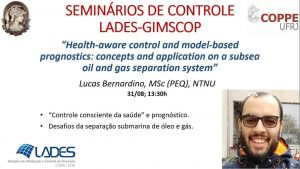
- This event has passed.
Health-aware control and model-based prognostics: concepts and application on a subsea oil and gas separation system
August 31, 2020 @ 1:30 pm - 3:00 pm

Todos gentilmente convidados para o 16o SEMINÁRIO DE CONTROLE LADES-GIMSCOP
Palestrante: Lucas Ferreira Bernardino, MSc, NTNU
Link para a apresentação: meet.google.com/wmh-dnnk-wfn ·
Neste Seminário, Lucas apresentará os resultados de seu Mestrado desenvolvido no PEQ/COPPE.
Abstract:
“In this presentation, we will discuss concepts of health-aware control and system prognostics. Prognostics is a key activity in process systems, especially in subsea processes, where it is necessary to minimize intervention in equipment. In this context, health-aware control uses prognostics information to guide the process to acceptable operating points, either by imposing constraints on system degradation metrics or by incorporating degradation into the cost function. These concepts were applied to the health-aware operation of a subsea CO2 separation system, which was modelled as a differential-algebraic equation system. Simulations were performed using libraries based on methods from the Scipy and Assimulo libraries.
In terms of control, previously identified linear models were used in a predictive controller with Kalman filter-based state estimation and online model update, and simulations were performed to evaluate the controller tuning. Regarding prognostics, a stochastic model of pump degradation, sensitive to its operating conditions, was proposed, and a particle filter was implemented to perform online degradation state estimation and remaining useful lifetime prediction. Finally, a health-aware controller was designed, which could extend the life of the process by four months when compared to operation with a conventional model predictive controller. Some difficulties in combining reference tracking and lifetime extension objectives were also investigated. The obtained results indicate that dealing with the control problem through the multiobjective optimization theory or addressing the lifetime extension in an optimization layer may improve its performance.”
Bio:
“Lucas Ferreira Bernardino has a bachelor’s degree in Chemical Engineering from Escola de Química – UFRJ (2017) and a MSc degree in Chemical Engineering from PEQ – COPPE/UFRJ (2019). He is currently a PhD student at the Department of Chemical Engineering of NTNU. His current research focus is in machine learning tools applied to process modeling, control and optimal operation.”
